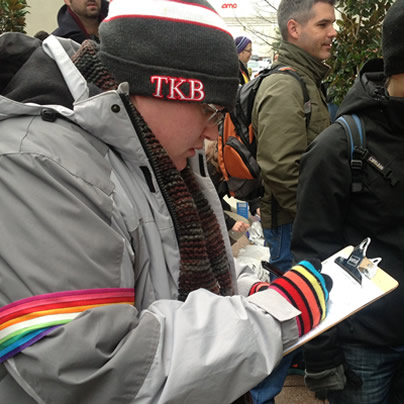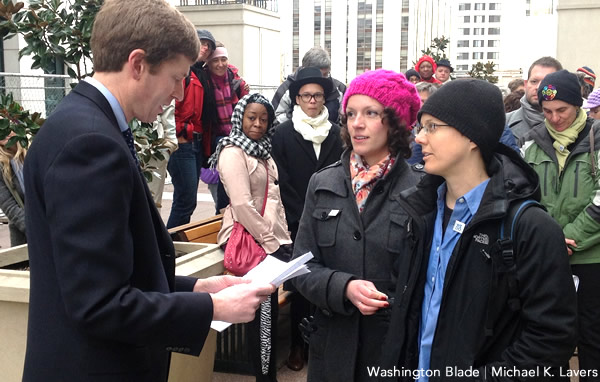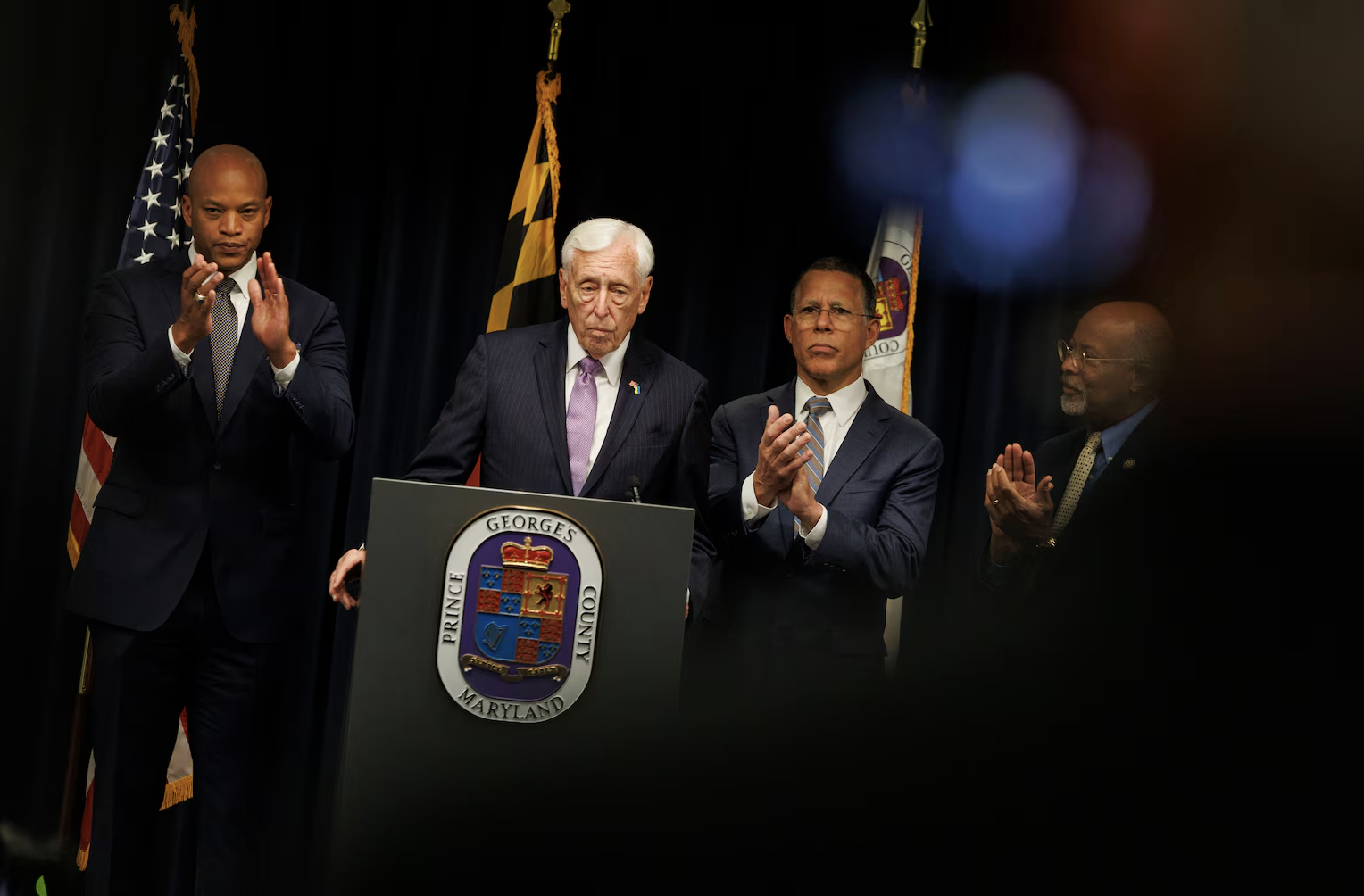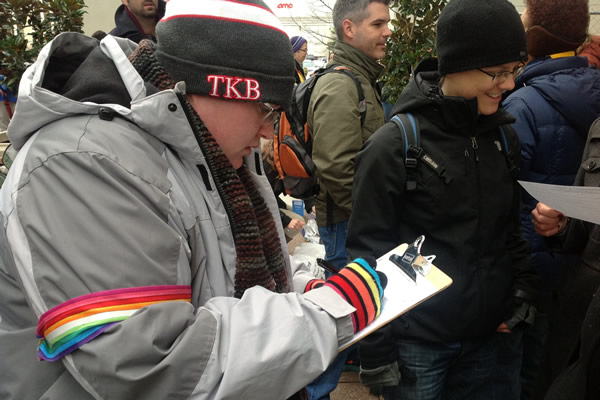Local
Same-sex couples seek Va. marriage licenses
Campaign for Southern Equality’s “We Do” campaign ended with march to D.C.


From left; D.C. residents Alyssa Weaver and Mike McVicker, who are from South Carolina, apply for a marriage license outside the Arlington County Courthouse on Jan. 17. (Washington Blade photo by Michael K. Lavers)
More than a dozen same-sex couples from across the South gathered outside the Arlington County Courthouse on Thursday to apply for marriage licenses.
Gays and lesbians from Alabama, Georgia, Mississippi, Tennessee and North and South Carolina submitted applications to Arlington Circuit Court Clerk Paul Ferguson in the complex’s plaza. A constitutional amendment that Virginia voters approved in 2006 defines marriage as between a man and a woman in the commonwealth, but those who participated in the action described their decision to take part as symbolic.
“We’re here to resist the unjust laws that label us as second class citizens and to call for full equality on the federal level,” Ivy Hill of Piedmont, S.C., told the Washington Blade after she filled out a marriage license in the complex plaza.
She and her partner of more than two years, Misha Gibson, recently became engaged.
“I’m here today to request a marriage license and knowingly being denied, but doing that to make sure that people know that we’re equal,” Gibson said. “I’m doing it to fight for my civil rights.”
Beth Schissel and Sally White of Atlanta joined four other same-sex couples who tried to apply for marriage licenses in Decatur, Ga., earlier this month.
White, who lived in Richmond for 30 years, joked with the Blade after Ferguson declined to issue them a marriage license she traveled to Virginia with her partner as a way to celebrate her birthday on Saturday.
“I’m a pediatric ER doctor,” Schissel said with tears in her eyes. “I take care of your children and take care of the sick and injured and I served my country. I went to the Air Force Academy and I served my country on active duty and yet I can’t have all the rights that are afforded me under that word marriage under federal law. So it’s a slap in the face type of feeling and it hits you deep in your core.”
The Arlington protest was the last in a series of actions organized by the Campaign for Southern Equality to highlight a lack of marriage rights for same-sex couples in the South and to urge the federal government to extend full equality to LGBT Americans.
The “We Do” campaign kicked-off in Hattiesburg, Miss., on Jan. 2 when five gay and lesbian couples applied for marriage licenses. Others followed suit in Mobile, Ala., Morristown, Tenn., Greenville, S.C., and three North Carolina cities before traveling to Virginia.
“We all live here in the South and we’re Southern folks,” Rev. Jasmine Beach-Ferrara, executive director of the Campaign for Southern Equality, who is also an ordained minister with the United Church of Christ in Asheville, N.C., told the Blade in an interview earlier this month. “This is where we live and we’re working with LGBT folks in small towns and cities across the region who are ready to stand up for equality — federal equality in new ways.”
She stressed her group’s approach to highlight the lack of marriage rights for same-sex couples below the Mason-Dixon Line reflects a broader strategy.
“We do feel like because this is the region where discriminatory laws are most deeply enshrined in state law, it creates a really powerful and unique opportunity to revisit those laws by using peaceful, direct action,” Beach-Ferrara said. “What we’re doing with the ‘We Do’ campaign is folks are taking action in their local communities to resist these state laws, to show what happens when they’re actually enforced. They’re typically invisible because they’re so rarely enforced, if at all. And so the general public is sort of insulated from the reality that we live with day in and day out as LGBT folks in the South, which is these laws exist, but when they’re actually enacted and enforced there’s an opportunity to talk about what that actually means and how that hurts real people and real families.”
Matt Griffin and Raymie Wolfe of Morristown, Tenn., who have been together for more than seven years, sought a marriage license in their hometown on Jan. 9.
Wolfe told the Blade before he and his partner tried to obtain a Virginia marriage license that they were “met with good humor” when they tried to do the same in Tennessee. He noted the clerk said it was the first time a gay couple had ever applied for a marriage license in the town — she did reaffirm the Tennessee does not recognize nuptials for gays and lesbians.
“What we wanted to do was kind of illustrate for people and ourselves what happens when we do that,” Wolfe said. “That’s kind of unprecedented. That was my hometown. It’s where I grew up and as a gay kid there, I kind never imagined that i would be going to a courthouse with a partner and applying for a marriage license.”
Same-sex couples gathered in Arlington three days after a Virginia House of Delegates subcommittee voted against a proposal that would have repealed the state’s constitutional ban on same-sex marriage.
Neighboring Maryland is among the nine states and D.C. that allow gays and lesbians to tie the knot. North Carolina voters last May approved a constitutional amendment that defined marriage as between a man and a woman by a 61-39 percent margin, while Minnesota voters on Election Day rejected a similar proposal.
The upcoming oral arguments before the U.S. Supreme Court in cases challenging the constitutionality of the Defense of Marriage Act and California’s Proposition 8 also weighed on the minds of the same-sex couples who applied for marriage licenses and those who witnessed them do so.
“I’m very sympathetic to what the people who came before me today are trying to do and I am happy that there’s other jurisdictions where they can go to have their marriage licenses processed,” Ferguson, who is a former member of the Arlington Board of Supervisors, told the Blade. “There’s a Supreme Court decision coming up and so that will add some clarity to a lot of these peoples’ marriages, which is what they were looking for.”
Tim Young and Mark Maxwell of Winston-Salem, N.C., legally married at the Jefferson Memorial after they and other same-sex couples who had sought Virginia marriage licenses marched from Arlington to the nation’s capital.
“We live our lives in a way where we are not denied anything and we are open to being prosperous and successful,” Young, who has been with Maxwell for 20 years and raised four boys with him, said. “We’ve educated ourselves. We run a business so we pay taxes in that state and we give our money to that state, but we don’t have the same rights as other people and we believe in equity and equality.”
Beach-Ferrara noted her group made a deliberate decision to end their latest campaign in D.C.
“It’s in a lot of ways a small, intimate group, but of folks who traveled on a journey that’s symbolic in a lot of ways in the sense that if you live in the South, you need to travel to Washington, D.C., before you can be recognized as an equal citizen,” she said. “The journey folks have taken sort of helps to illustrate the legal realities that LGBT folks live with, which is you are a second class citizen until you reach the Washington border.”
Virginia
Gay Va. State Sen. Ebbin resigns for role in Spanberger administration
Veteran lawmaker will step down in February

Alexandria Democrat Adam Ebbin, who has served as an openly gay member of the Virginia Legislature since 2004, announced on Jan. 7 that he is resigning from his seat in the State Senate to take a job in the administration of Gov.-Elect Abigail Spanberger.
Since 2012, Ebbin has been a member of the Virginia Senate for the 39th District representing parts of Alexandria, Arlington, and Fairfax counties. He served in the Virginia House of Delegates representing Alexandria from 2004 to 2012, becoming the state’s first out gay lawmaker.
His announcement says he submitted his resignation from his Senate position effective Feb. 18 to join the Spanberger administration as a senior adviser at the Virginia Cannabis Control Authority.
“I’m grateful to have the benefit of Senator Ebbin’s policy expertise continuing to serve the people of Virginia, and I look forward to working with him to prioritize public safety and public health,” Spanberger said in Ebbin’s announcement statement.
She was referring to the lead role Ebbin has played in the Virginia Legislature’s approval in 2020 of legislation decriminalizing marijuana and the subsequent approval in 2021of a bill legalizing recreational use and possession of marijuana for adults 21 years of age and older. But the Virginia Legislature has yet to pass legislation facilitating the retail sale of marijuana for recreational use and limits sales to purchases at licensed medical marijuana dispensaries.
“I share Governor-elect Spanberger’s goal that adults 21 and over who choose to use cannabis, and those who use it for medical treatment, have access to a well-tested, accurately labeled product, free from contamination,” Ebbin said in his statement. “2026 is the year we will move cannabis sales off the street corner and behind the age-verified counter,” he said.
Maryland
Steny Hoyer, the longest-serving House Democrat, to retire from Congress
Md. congressman served for years in party leadership

By ASSOCIATED PRESS and LISA MASCARO | Rep. Steny Hoyer of Maryland, the longest-serving Democrat in Congress and once a rival to become House speaker, will announce Thursday he is set to retire at the end of his term.
Hoyer, who served for years in party leadership and helped steer Democrats through some of their most significant legislative victories, is set to deliver a House floor speech about his decision, according to a person familiar with the situation and granted anonymity to discuss it.
“Tune in,” Hoyer said on social media. He confirmed his retirement plans in an interview with the Washington Post.
The rest of this article can be found on the Baltimore Banner’s website.
District of Columbia
Kennedy Center renaming triggers backlash
Artists who cancel shows threatened; calls for funding boycott grow

Efforts to rename the Kennedy Center to add President Trump’s name to the D.C. arts institution continue to spark backlash.
A new petition from Qommittee , a national network of drag artists and allies led by survivors of hate crimes, calls on Kennedy Center donors to suspend funding to the center until “artistic independence is restored, and to redirect support to banned or censored artists.”
“While Trump won’t back down, the donors who contribute nearly $100 million annually to the Kennedy Center can afford to take a stand,” the petition reads. “Money talks. When donors fund censorship, they don’t just harm one institution – they tell marginalized communities their stories don’t deserve to be told.”
The petition can be found here.
Meanwhile, a decision by several prominent musicians and jazz performers to cancel their shows at the recently renamed Trump-Kennedy Center in D.C. planned for Christmas Eve and New Year’s Eve has drawn the ire of the Center’s president, Richard Grenell.
Grenell, a gay supporter of President Donald Trump who served as U.S. ambassador to Germany during Trump’s first term as president, was named Kennedy Center president last year by its board of directors that had been appointed by Trump.
Last month the board voted to change the official name of the center from the John F. Kennedy Memorial Center For The Performing Arts to the Donald J. Trump And The John F. Kennedy Memorial Center For The Performing Arts. The revised name has been installed on the outside wall of the center’s building but is not official because any name change would require congressional action.
According to a report by the New York Times, Grenell informed jazz musician Chuck Redd, who cancelled a 2025 Christmas Eve concert that he has hosted at the Kennedy Center for nearly 20 years in response to the name change, that Grenell planned to arrange for the center to file a lawsuit against him for the cancellation.
“Your decision to withdraw at the last moment — explicitly in response to the Center’s recent renaming, which honors President Trump’s extraordinary efforts to save this national treasure — is classic intolerance and very costly to a non-profit arts institution,” the Times quoted Grenell as saying in a letter to Redd.
“This is your official notice that we will seek $1 million in damages from you for this political stunt,” the Times quoted Grenell’s letter as saying.
A spokesperson for the Trump-Kennedy Center did not immediately respond to an inquiry from the Washington Blade asking if the center still planned to file that lawsuit and whether it planned to file suits against some of the other musicians who recently cancelled their performances following the name change.
In a follow-up story published on Dec. 29, the New York Times reported that a prominent jazz ensemble and a New York dance company had canceled performances scheduled to take place on New Year’s Eve at the Kennedy Center.
The Times reported the jazz ensemble called The Cookers did not give a reason for the cancellation in a statement it released, but its drummer, Billy Hart, told the Times the center’s name change “evidently” played a role in the decision to cancel the performance.
Grenell released a statement on Dec. 29 calling these and other performers who cancelled their shows “far left political activists” who he said had been booked by the Kennedy Center’s previous leadership.
“Boycotting the arts to show you support the arts is a form of derangement syndrome,” the Times quoted him as saying in his statement.
-

 National3 days ago
National3 days agoWhat to watch for in 2026: midterms, Supreme Court, and more
-

 District of Columbia4 days ago
District of Columbia4 days agoTwo pioneering gay journalists to speak at Thursday event
-

 Colombia4 days ago
Colombia4 days agoBlade travels to Colombia after U.S. forces seize Maduro in Venezuela
-

 a&e features4 days ago
a&e features4 days agoQueer highlights of the 2026 Critics Choice Awards: Aunt Gladys, that ‘Heated Rivalry’ shoutout and more



















